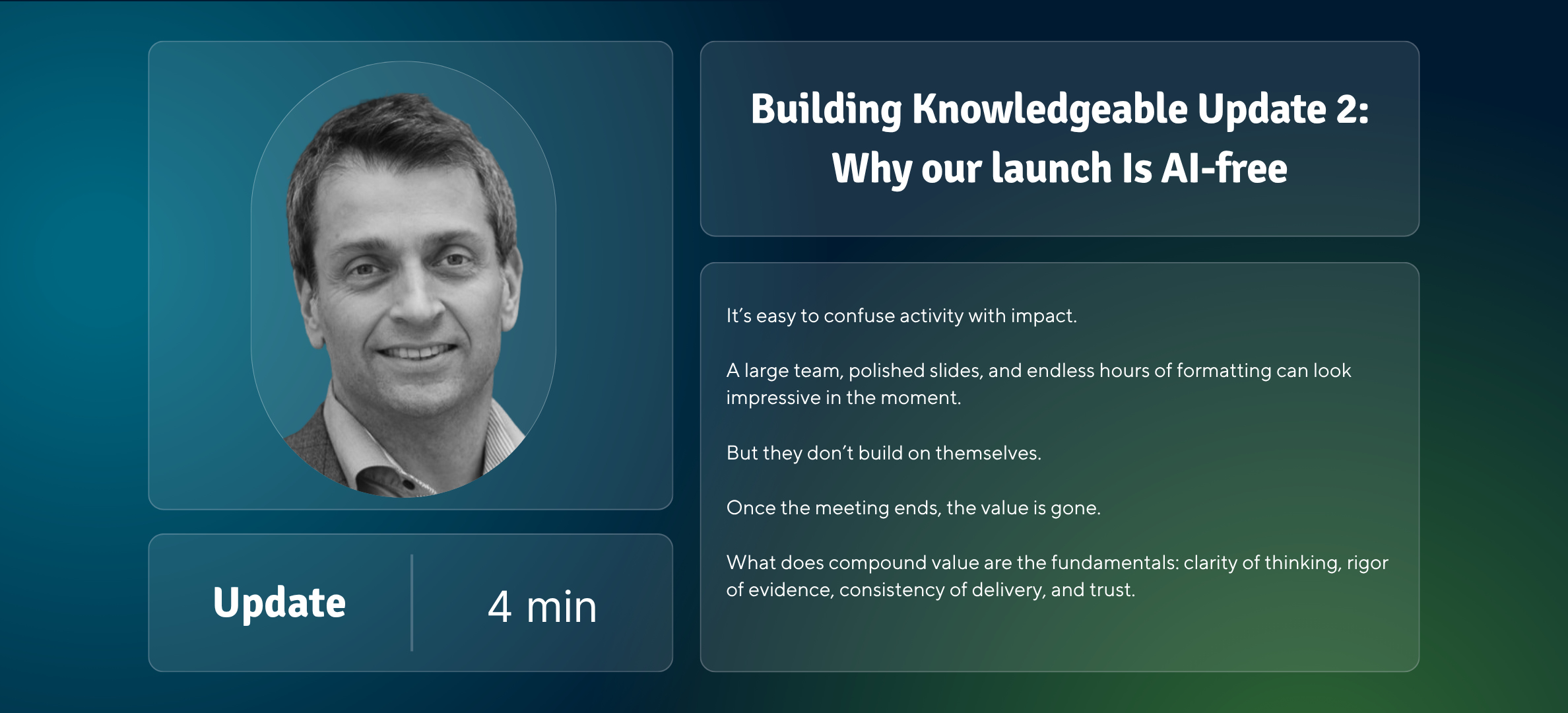
When aviation first introduced autopilot, regulators were cautious. The technology could technically fly and even land a plane, but no one was ready to remove the pilot. Decades later, that still has not changed. Autopilot has evolved through billions of flight hours, yet we still keep pilots in the cockpit. Not because the system is incapable, but because human judgment remains essential.
That is how we think about AI. It can automate, optimize, and enhance, but it should never replace the people who carry responsibility for outcomes. Trust in automation comes not from removing the human, but from building systems so reliable, so explainable, and so well tested that human oversight becomes empowered, not redundant.
At Knowledgeable, that philosophy sits at the heart of everything we build. We are applying the same discipline aviation used to earn trust in autopilot.
That’s why, as we launch this month, we’re making a deliberate choice: no AI on day one.
Why digital foundations matter
When autopilot first emerged, aircraft systems had to be re-engineered around it. Sensors, hydraulics, and safety protocols all had to work seamlessly before automation could be trusted. The same principle applies to AI. Without the right digital foundations, in a regulated space, AI creates more problems than it solves.
We are beginning with structure: how knowledge is captured, shared, and reused; how workflows hold up under pressure; how teams collaborate transparently with clients. These are the systems that make AI safe, auditable, and scalable when it is introduced.
In six months, when Knowledgeable’s AI is released, it will not be a prototype or a marketing headline. It will be an integrated, rigorously tested system that meets the standard of autopilot grade. I don't think I'm being hyperbolic when I say that i think it will change the industry.
The path to getting there
AI has enormous potential to accelerate every aspect of Market Access work. It can sharpen scoping, strengthen evidence gathering, and make workflows traceable at scale. But before it can truly take off, it needs to reach the same level of reliability that autopilot achieved before regulators trusted it for commercial flight. That means every function must be explainable, auditable, and grounded in trusted sources.
Just as aircraft had to be re-engineered for autopilot, Market Access needs the same foundational rebuild before AI can operate safely and effectively. That is the work we are doing now. We are focused on solving the difficult but essential problems: literature reviews built on a clear ontology rather than black box automation; HTA intelligence that compares decisions with context across markets; pricing tools that capture country-level granularity and historical trends; and stakeholder mapping that uses disambiguation to show who truly drives influence.
These are not simple challenges, but they are the ones that build trust and create systems strong enough to support real AI. This is why our focus has never been on chasing hype. It has been on reinforcing the fundamentals that define great consultancies: clarity of thinking, rigor of evidence, consistency of delivery, and trust. These are what compound value over time, and when the systems beneath are strong enough to hold the weight, AI can amplify them beyond what has ever been possible.
Learning what works
We have been integrating AI into consulting workflows for more than a decade. Our theory has not changed: ontology, grounding, disambiguation, and attribution remain the cornerstones. What has evolved is how we apply them. Through continuous testing, we are learning not just what works, but why.
That is why this process takes time. We are embedding more than one thousand prompts across the entire consulting lifecycle. That complexity makes the system harder to build, but it ensures that when AI goes live, it performs with precision, transparency, and reliability. Like aviation, the goal is not automation for its own sake, it is safety, performance, and trust.
And just as pilots are still in the cockpit, consultants will always be at the controls. AI will not replace them; it will give them the capacity to think more deeply, to make better decisions, and to focus on what truly matters.
The takeoff phase
Autopilot did not remove the pilot; it removed the errors that come from fatigue and repetition, while leaving room for human foresight and adaptability. That is how AI should work in consulting, if built on the right foundations.
The firms that lead in this next era will be those that understand this balance. The post-hype leaders. The consultancies that invest now in their digital foundations so they can deploy AI later with confidence, clarity, and control.
If you want to see where your consultancy stands, try our free Digital Foundations Diagnostic Tool. In just a few minutes, it will show you where your workflows are strong, where they may be vulnerable, and what steps you can take to prepare for AI implementation.
Over the next few weeks, we will also share our Buy vs Build Framework, a practical decision model to help consultancies plan their approach to AI adoption.
The path forward is not about rushing into automation. It is about building trust first, so when AI does take flight, you know exactly who is in control.

